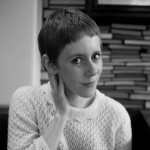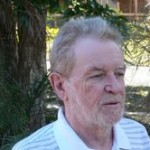November 6, 2012 / mascara / 0 Comments
 Tiffany Tsao grew up in Singapore and Indonesia, has spent time in the UK and US, and now resides in Sydney, Australia. She earned her PhD from UC-Berkeley in May 2009 and is a currently a lecturer in English at the University of Newcastle, Australia. In addition to writing fiction and poetry, she publishes on English and Indonesian literature. She keeps a blog at http://tiffanytsao.com
Tiffany Tsao grew up in Singapore and Indonesia, has spent time in the UK and US, and now resides in Sydney, Australia. She earned her PhD from UC-Berkeley in May 2009 and is a currently a lecturer in English at the University of Newcastle, Australia. In addition to writing fiction and poetry, she publishes on English and Indonesian literature. She keeps a blog at http://tiffanytsao.com
The Sprig
The man in the photo is a green shoot of a man
a slim-waisted sprig
a pocket-watch spring
with ears like the wings of a jumbo jet.
He’ll take off and you better catch on.
The shades of white and grey can’t hide
his technicolour visions.
Through the creased paper protrudes
a jaunty ambition swelling by the second.
I think his rakish moustache just sprouted another hair.
I know how he’ll unfurl.
He will build empires.
He will populate the earth.
He will feed multitudes.
He will shower the land with dollar bills.
Then: a modest monument, a humble knighthood,
a self-commissioned portrait hanging in the hallway.
But let’s keep this a secret
or he’ll never get over himself.
November 5, 2012 / mascara / 0 Comments
 Jas writes short fiction, poetry, plays and has just finished her second novel. Her stories have appeared in various journals, including Verity La where she now reads submissions. She lives in Fremantle with her partner and dog.
Jas writes short fiction, poetry, plays and has just finished her second novel. Her stories have appeared in various journals, including Verity La where she now reads submissions. She lives in Fremantle with her partner and dog.
String
I want to stretch my life onto a long piece of string, connected to nothing at either end. Every moment which has meant something will be cut and tied back together. I cut the string to signal the heart stopping, I tie it back together to show I am still alive. I have to cut it several times, here for when I realised your beauty, and here again when I realised my love. I’ll cut it when you come back to me, just like I did when you left.
The lesson of love and cigarettes
You tried to teach me how to roll a cigarette; I roll my own now with such ease that I forget it was you who taught me and only think of it once five years later. I remember sitting on your balcony, which we peered over in silent agony waiting for your girlfriend to arrive. You taught me ill-fated love. You taught me to make you gin and tonic while you begged your mind for any excuse to ask me to leave, and found none, and so I stayed and brought you the gin you drank so well. You taught me the game of love, the notion of winning and losing, and you were my first loss. You taught me secrets, how to keep them and how to confess them at the wrong time. You taught me to swallow love and burn desire. You taught me the power of a door—once closed—a lover can never enter. You tried to teach me how to roll a cigarette. I roll my own now and think of you, but just this once and not again for another five years.
Winter
Suddenly the night air
laid down its arms
and allowed the cold to take over.
And as we entered the street
we were struck with the unmoving chill
that stood waiting on the pavement
and outside windows.
Our bodies shrivelled like leaves
and we caught our breath warm in our throats.
At your house the cold was forgotten.
The frosted street lamps,
the wet grass,
our frozen breath
—forgotten.
November 5, 2012 / mascara / 0 Comments
 DianeSahms-Guarnieri is currently Poetry Editor of The Fox Chase Review, and co-curates The Fox Chase Reading Series. Her first full length collection of poetry, Images of Being, (StoneGarden.net publishing) was released October 2011. You can visit her at http://www.dianesahms-guarnieri.com/
DianeSahms-Guarnieri is currently Poetry Editor of The Fox Chase Review, and co-curates The Fox Chase Reading Series. Her first full length collection of poetry, Images of Being, (StoneGarden.net publishing) was released October 2011. You can visit her at http://www.dianesahms-guarnieri.com/
Aluminum
Unnoticed as flowers dying
or slugs crawling
they pass as divers into liquid night
mysterious as the sick yellow glow
of hazy streetlights, using a perfect
stream of blue laser light to shine into
a line of curbside recycling bins.
They mine aluminum.
It’s faint rattle wakes me
like raccoons stirring inside dumpsters.
From the distance of my bedroom window
they are of small statue; dressed in darkness
a mismatched pair: jack of spades: queen of clubs
placing each can into bundles
of plastic handled bags to muffle the sound
filling their stolen shopping carts
rolling out of sight.
November 5, 2012 / mascara / 0 Comments

John Tranter is Australia’s most highly-awarded poet. His book Urban Myths: 210 Poems: New and Selected (2006) won four major state awards, and his latest book, Starlight: 150 Poems (2010), won the Melbourne Age Book of the Year poetry award and the Queensland Premier’s Award for Poetry. He received a Doctorate of Creative Arts from the University of Wollongong and is an Honorary Associate in the University of Sydney School of Letters, Arts and Media and an honorary fellow of the Australian Academy of the Humanities. He has given more than a hundred readings and talks in various cities around the world. He has published more than twenty collections of verse, and has edited six anthologies, including The Penguin Book of Modern Australian Poetry (with Philip Mead) which was a standard text for twenty years. He founded the free Internet magazine Jacket in 1997 and granted it to the University of Pennsylvania in 2010, he is the founder of the Australian Poetry Library at http://poetrylibrary.edu.au/ which publishes over 40,000 Australian poems online, and he has a Journal at johntranter.net, a regular Commentary page at https://jacket2.org/commentary/john-tranter and a vast homepage at johntranter.com.
Photogaph: John Tranter, Cambridge, 2001, by Karlien van den Beukel
Poem Beginning with a Line by Kenneth Koch
This Connecticut landscape would have pleased Vermeer:
The pearly light that photographs the town,
The autumn blessing and the bitter cheer
of winter close behind, with frosty crown.
The weekender lies abandoned for the week,
the den and sunroom vacant. On a couch,
the New Yorker open at a page that speaks
of Aquascutum, Harris Tweed and scotch.
O Aquascutum, shield me from the blast,
And Harris Tweed, protect me from the cold.
As for scotch, let’s leave it till the last
To warm my aching bones as I grow old.
Vermeer, to please his mistress, heard her sighs,
And painted pretty landscapes full of lies.
Another Poem Beginning with a Line by Kenneth Koch
This Connecticut landscape would have pleased Vermeer —
The trash, the pickup truck, the cans of beer —
If only Vermeer hadn’t been such a shit.
Oh well, it’s hard for an artist to paint a hit —
To make the cut, to climb the greasy grade,
To make a real impression on the trade —
It’s really hard, when you’re totally pissed.
It isn’t easy, when you’ve slit your wrist.
So fuck Connecticut and fuck Vermeer —
Who is this Dutchman with his can of cheer?
I’d rather look at Guston, or some Pollocks —
Who cares if the theory’s mostly bollocks?
The landscape is really just a frame
For something that just sat there all the same.
November 5, 2012 / mascara / 0 Comments
 Ainslee Meredith is a poet, editor and student from Melbourne. Her poetry has been published in various places, including Going Down Swinging, Southerly, harvest, and Voiceworks. In 2011, she won the John Marden Prize for Young Australian Writers (Poetry). Her first collection will be published by Express Media and Australian Poetry in 2013.
Ainslee Meredith is a poet, editor and student from Melbourne. Her poetry has been published in various places, including Going Down Swinging, Southerly, harvest, and Voiceworks. In 2011, she won the John Marden Prize for Young Australian Writers (Poetry). Her first collection will be published by Express Media and Australian Poetry in 2013.
Fallen Woman
The clearest night is still unlit
when she calls, so closely,
on the telephone nobody watched;
saltwater and snow-water
fire-break the causeway, send
patina torches up
like false churches. The dream
is an antelope
hit to the side of the road
by a car going to swamp
for fuel. A way to ascension, this
hold on my head you have even as
I walk from South Hero
to your hotel on the game
road, forging breaths
solid as oncoming eyes.
Anna: a man followed me
because I was alone and lost
my right to choose between men,
or to not choose at all.
But the tide is low:
I am clear to cross
with my hands in my pockets,
bent over under the full moon.
Mauvais livres
Once there was a girl and she
was a ladder
inside a grandfather clock.
On her spine
a bookplate read À L’INDEX
as in ‘Brother Léon forbids this one.’
She had a date in the grand library,
but walking down Saint-Denis
the sea shone through her
brass escapement, its words
of surety: Messrs London c.
She could stand all night
on a graveyard shift
outside the Cinéma ’quoise,
unfaithful letters in
dead-cold hands, defining
those spent images – a risen
mass, clockwise, a lost
war, 5 a.m. doorstep, a child
born to a woman and a bear,
cusped sleep. After all, the librarian
won, hid her in the inner pocket
of his wooden overcoat. Like that,
a pillowcase for quiet hands.
November 5, 2012 / mascara / 0 Comments

Grace V. S. Chin, a former Malaysian journalist, holds a PhD in English Literature from the University of Hong Kong. She currently teaches English Literature and Drama Studies at the University of Brunei Darussalam. Her poems have been published in Hong Kong U Writing: An Anthology, Sweat & The City: Stories and Poems from the Hong Kong Workplace, and Cha: An Asian Literary Journal.
Patchwork
In History class, I sat with my eyes
closed, listening, to the drone
of the teacher’s voice, each word
losing its way in the drowsy
afternoon heat. A fu-
fuzzy-faced boy entered
my daymare, his disjointed arms
reached out, jarring me
into wakefulness.
“Why,” he asked
in plaintive tones,
“you cannot speak
Mandarin-ah? It’s your
Mother Tongue.”
Groggy and stunned, I groped
in wavering Cantonese, voice strained
with explanations, syllables leaking
with every translated English word.
How
do I describe
my patchwork
self? I speak
Cantonese at
home, dream,
think and talk
English
with friends, learn
to read
and write Malay
at school.
How
do I sift
these jumbled-up
tongues, as delicious
as rojak, separate one
from the other, and you lose
their precious taste.
That afternoon, his question rang
in my head, and only the branch
screeetch-scratching
the window pane outside
spoke for me.
Conversations with my dead mother
Conversations with my dead mother are rare
I should think
but she keeps coming to me
when I am quiet and pliant
in my sleep. It’s not fair,
I cry, hearing the slush
of heavy water in my bones.
“You don’t eat enough,” she declares
each time we meet. As if stuffing face
would help ease my pangs, or take away
the silted memories. She sits
with legs crossed on the kitchen
stove, a fat female Buddha
with Mona Lisa’s smile, grandly waving
her spatula like a wand, granting me wishes
that never came true for her.
She spent her life here,
boiling black bittersweet
medicinal herbs to chase away
our childhood demons, cooking
all day long in her big black
steel wok, a thousand aromas hung
in the air, each defining her
in ways we never knew — her
longbeans stir fried in belachan,
chicken braised in soya sauce
and chopped red chilis, nasi lemak,
onde onde, pandan chiffon cakes,
curry chicken, square tofu topped
with minced pork — while little brother
and I played on the table, hands deep
in floury dough as she chopped
her way into our stomachs
and hearts, and scrubbed
her wok until fingers were raw
and wrinkled. She aged
before our eyes but we
did not know it, shutting
our eyes and ears to the smashing
of glasses thrown onto walls, the yelling
for us to leave her alone, the crying
when father failed
to come home, the crashing
of her body on the floor.
All at once, I am
my mother’s daughter again,
chopper in hand, dicing small,
red onions at the sink, eyes blinded
by the sting of tears, they fall, one
after the other, flowing
like unspoken words
into the sinkhole.
November 5, 2012 / mascara / 0 Comments
 Tim Grey is a writer from Melbourne, who works a journalist, photographer and editor. He’s also part of The Red Room Company, where he helps create, publish and promote poetry in unusual ways.
Tim Grey is a writer from Melbourne, who works a journalist, photographer and editor. He’s also part of The Red Room Company, where he helps create, publish and promote poetry in unusual ways.
Cave
“it bundles in the mangrove, caulked
on waterline. the etymology incomplete;
black and clear below.
a second beer swims and fizzles
with repetition. sunrise panics and
spills like breath or my letter.
hair like hair; my hand dripping out
like your hand or my hair. red quartz
lay like leaves everywhere. don’t
american jets curl and wake
us, their hands the definite articles
that knit the map to land.
wood unravels a proletarian scent,
water burns a bag in the earth,
underneath. we wait.
hematite raft climb down and go
somewhere secret. busts in the ash-sand
peculiar grass waving a grid
on the sea-bed, the half moon
on a gorge. say nothing but the sand-path, which
is all the word means: sister”
Soon
flat sunlight transports its late sticks to that other, bees
plumb and phase , meddle with transparency; the lip
of smell. sunlight palls, a bridge through substance parted
spring is mouth in her small privacy. she watches
girls float on the asphalt pause, pool between convent and
Brougham, imagine they’re unseen. iron fencing clots and
weaves. a fairlane slows to boat. from the facility
above, the westerly fumbling at the window, grasslands
pressed against almost, municipal. the dryer wets the walls.
small language of her
shopping closing on the bench. the elevator’s every zone
November 1, 2012 / mascara / 0 Comments

Dan Disney was born in 1970 in East Gippsland, where he grew up. He has worked in psychiatric institutions, paddocks, warehouses, and universities, and currently divides his time between Melbourne and Seoul, where he lectures in twentieth-century poetries at Sogang University. Articles and poems appear in Antithesis, ABR, Heat, Meanjin, New Writing, Overland, Orbis Litterarum, and TEXT, and poems have recently received awards in the Josephine Ulrick Poetry Prize (2nd) and the Dorothy Sargent Rosenberg Prize (USA). He is on the advisory board of Cordite scholarly. His first full collection of poems, and then when the, was published by John Leonard Press in 2011.
‘only someone who already knows how to do something with it can significantly ask a name’
—— from Wittgenstein’s Tractatus
old buildings, falling out the sky
after the shriek of love leaves her body
I’m still there, a peasant and ass
laboring through dark hills toward the small bright windows
of infinity
meanwhile, afternoon seethes across a mechanical sky
the tzzz-ing of aircon
telling cicadas the rain
is a promised machine falling in pieces
‘don’t go’, I tell
her eyes darkly flicking, a slow
river in my shadow
listening to echoes deep in cold
mountains
(knee-high, green texta, weedy piss-stained carpark wall)
‘be the beauty you wish to see in the world’
I spent childhood in a hurricane. Hungry dogs wolved at the door.
Mother was an old television, father a fourth dimension. Had rain
fallen in downward lines, we’d have embraced and called it utopia
while deserts hurled themselves, sleeplessly, upon us
in the mind of the forest, the birds
are dreams tweeting rhapsodic operas. Flowers crane
their necks, louche
and metaphorical, while history looks on and falls
into place the way sunlight does. Morning is
thumping overhead, quipping ‘quieten!’ to the hives
chorusing a mist.
Thus the forest darkens, brightly
amid a copse of trees, ‘it’s not the flesh, drooped
and unblooming, but
our bones that groan so
beneath the slump of heaven’
the wooden temple amid hoarfrost. Her voice alone, is filled
with centuries. And when she talks, memories crowd
her bony feet and hop like chicks
(each sentence made of sunlight)
headline: ‘Bird of Paradise Cloned in Underworld
(Underworld Birds Not Happy)’
clutching the finger bones of dolls dreams
all the doors grinning
while night storms in: she’s there
in the corner of her lives
drinking the black
I was not there. The bird did nothing.
I was there pointing and the bird lifted and was then held out by air and this was called reality.
morning was a rain-smudged lens
focused into millennia
where strangers bent an early light
into shape
trailing the gloop of history indoors
new buildings, falling into the sky
October 27, 2012 / mascara / 0 Comments
 Ravi Shankar is a poet and critic and the editor of Drunken Boat. His first full length book was Instrumentality (Word Press, 2004). Along with Tina Chang and Nathalie Handal, he edited Language for a New Century: Contemporary Poetry from Asia, the Middle East & Beyond (W.W. Norton & Co.). His work has appeared in the New York Times and the Chronicle of Higher Education, and on the BBC and NPR. He teaches in Fairfield University’s MFA Program and in the first international MFA Program at City University of Hong Kong. Deepening Groove was winner of the 2010 National Poetry Review Press Prize.
Ravi Shankar is a poet and critic and the editor of Drunken Boat. His first full length book was Instrumentality (Word Press, 2004). Along with Tina Chang and Nathalie Handal, he edited Language for a New Century: Contemporary Poetry from Asia, the Middle East & Beyond (W.W. Norton & Co.). His work has appeared in the New York Times and the Chronicle of Higher Education, and on the BBC and NPR. He teaches in Fairfield University’s MFA Program and in the first international MFA Program at City University of Hong Kong. Deepening Groove was winner of the 2010 National Poetry Review Press Prize.
Urban Pastoral
Swarming cities,
gorged with dream,
opaque to the spectacle
of the spectral trace
left by bodies in motion,
in medias res, like after
a magician has left a pinch
of magnesium shaving
in the air to ignite
then vanished off-stage
in a wake of white
light. Not like
the Brobdingnagian
moment of monstrosity,
but rather the subtle
uncanny pushing out
gradually further
and further into
the mind until buds
burst into no blossom
ever before seen nor since.
Bop with a Refrain taken from Jonathan Safron Foer
Half-past on the 9:07 local to New Haven, the Bronx
tenements pent in vaguely post-apocalyptic paragraphs
rushing past too fast to cohere into prose, leaving loops
of graffiti, marred and boarded windows, a hoops game
glowing yellowish in the mercury vapor of street lights,
a Pontiac Bonneville, tireless, jacked up on cinder blocks.
Time waving like a hand from a train I wanted to be on.
Riding a train embodies democracy. Not like cramped,
dank seats of a bus or on the highway where cars mark
the demographic by make and model, here everything
is equalized, time and space included. The post-punk
pierced girl, ears plugged with music, sits next to a man,
silk cravat loosened, fixated on his snuff box, providing
the grand illusion of temporal continuity, the centuries
stacked one on top of the other, a set of encyclopedias.
Time waving like a hand from a train I wanted to be on.
Slouched in the seat, westbound, my forehead pressed
to the scratched up window, rapidly being carried away
from the city, something important recedes, something
else coheres, but I can’t seem to conjure a single word
as to what these might be, why I’m filled with such vast,
implacable sadness. I just want to get home, go to sleep.
Time waving like a hand from a train I wanted to be on.
October 27, 2012 / mascara / 0 Comments
 Mark Young has been publishing poetry for nearly fifty-five years. His work has been widely anthologized, & his essays & poetry translated into a number of languages. He is the author of more than twenty books, primarily poetry but also including speculative fiction & art history. He is the editor of the ezine Otoliths. He lives on the Tropic of Capricorn.
Mark Young has been publishing poetry for nearly fifty-five years. His work has been widely anthologized, & his essays & poetry translated into a number of languages. He is the author of more than twenty books, primarily poetry but also including speculative fiction & art history. He is the editor of the ezine Otoliths. He lives on the Tropic of Capricorn.

A line from Frantz Fanon
Leaving aside the
Gaelic for kiss my
ass, most Declarations
of Independence are
top heavy with awk-
ward or extremely
dated references. Some-
times they present
in the form of a
pure orange pocket
synthesizer with a
sound set restricted
to industrial use
because of extremely
mixed reviews. At
other times as an
holistic framework
that purports to look
at all aspects of life
as spiritual practice
but then recommends
the confining of women
to the home & the use
of tanks to shell densely
populated areas. Colon-
ialism begets patriarchal
systems. The methods
devour themselves.
A line from Fidel Castro 2
Winter is getting me
down. A unit of cult-
ural information has
put the Galactic Senate
under attack, driving
it from crisis to crisis.
That slavery is inexorably
tied to the availability
of oil is the standard
paradigm for most
crises; but now recent
breeding population
trends of farmland
birds need to be fact-
ored in. Please complete
the enquiry form below
& I will provide you
with a list of exclusive
Havana Vacation Homes
available for weekly rent.
A line from Courtney Love
English newspapers
laced up their tennis
shoes, Real Madrid
went on another goal
spree, the strife-prone
household insulation
program turned on
its heel & headed to
a park; but not even
a change in appetite &
toilet habits can stop
the generally low inter-
city mobility of urban
populations. So. We
drowned them all in
their swimming pools.
 Tiffany Tsao grew up in Singapore and Indonesia, has spent time in the UK and US, and now resides in Sydney, Australia. She earned her PhD from UC-Berkeley in May 2009 and is a currently a lecturer in English at the University of Newcastle, Australia. In addition to writing fiction and poetry, she publishes on English and Indonesian literature. She keeps a blog at http://tiffanytsao.com
Tiffany Tsao grew up in Singapore and Indonesia, has spent time in the UK and US, and now resides in Sydney, Australia. She earned her PhD from UC-Berkeley in May 2009 and is a currently a lecturer in English at the University of Newcastle, Australia. In addition to writing fiction and poetry, she publishes on English and Indonesian literature. She keeps a blog at http://tiffanytsao.com








